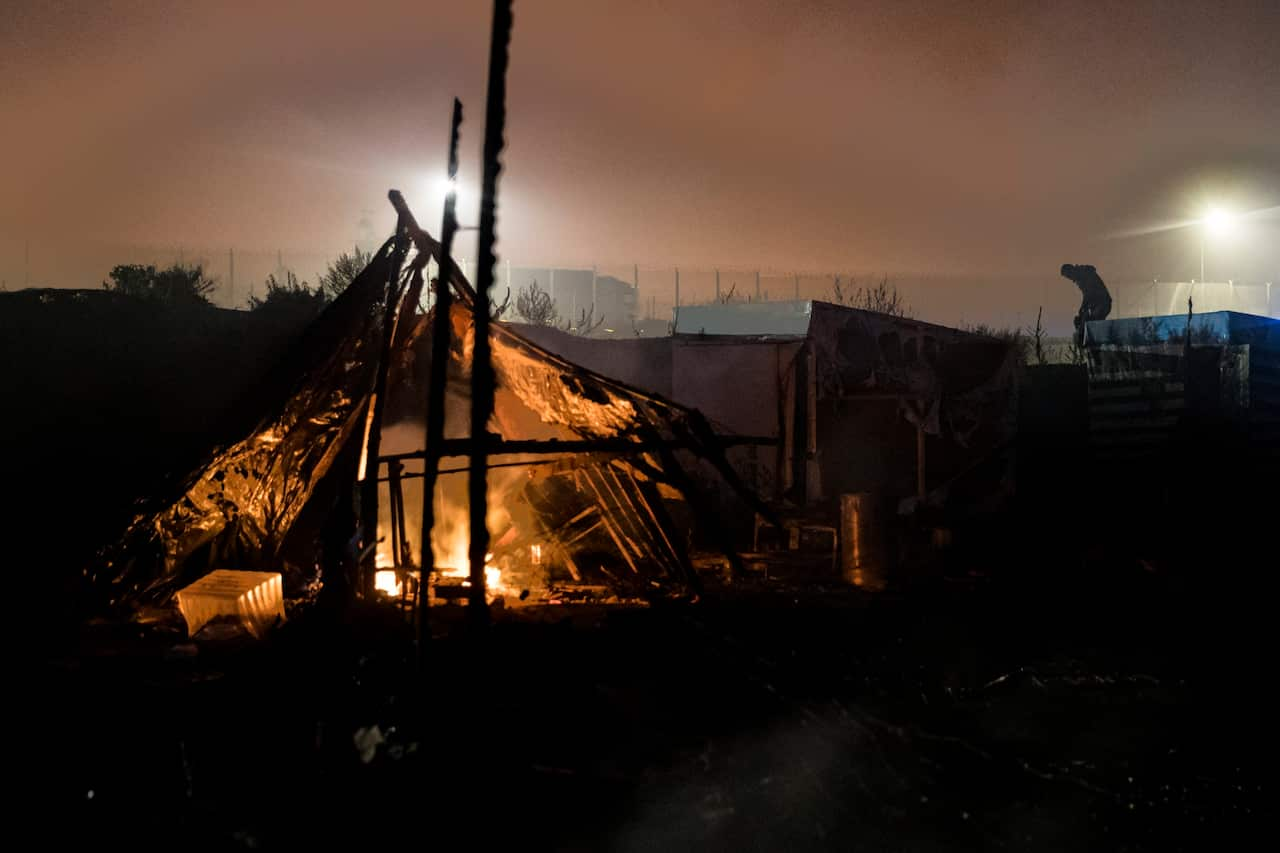"It's really the end of the Jungle today," said top regional official Fabienne Buccio. "A page has been turned."
Riot police were massed outside the main entrance to the camp near the port of Calais, barring migrants who had fled the blazes from going back in to retrieve their belongings.
Around 100 people could still be seen inside the Jungle late Wednesday afternoon as volunteers tried to persuade the migrants to leave.
"We're telling them it's the last day, that if they don't leave the police will arrest them and send them back to their countries," said Enrika, who works for the Lithuanian charity Care for Calais.

'We left our nations in flames'
Risking their lives to reach Calais with the hope of sneaking across the Channel to Britain, most of the migrants had fled conflict or persecution in countries such as Eritrea, Sudan and Afghanistan.
"We left our nations behind us in flames, only to find the Jungle go up in flames too," said Aziz Yaacoub, a 25-year-old from the troubled Sudanese region of Darfur.
The authorities have said those who agree to be moved can seek asylum in France.
Buccio said more than 5,000 migrants had left the camp by Wednesday afternoon, most boarding buses to head to shelters around France, and expected the departures to total "at least 6,600" by the end of the day.
Estimates of the camp's population ranged between 6,400 and 8,100 before the operation began Monday.
Upwards of 1,000 unaccompanied children are being housed temporarily at an on-site park of specially fitted -- and heated -- shipping containers.
Aid workers said the camp was full, with Samuel Hanryon, spokesman for Doctors Without Borders (MSF), warning that dozens of "unregistered minors are wandering around, lost, wondering where they will spend the night".
Head of France Terre d'Asile, Pierre Henry, whose organisation is tasked with the care of minors in the evacuation, confirmed that their registration had been interrupted.
"There is no more space in the container camp," Henry said.
The fate of unaccompanied minors has been a key cause of concern on both sides of the Channel, leading to testy exchanges between the French and British authorities.
French Interior Minister Bernard Cazeneuve said Tuesday that all minors "with proven family links in Britain" would eventually be transferred there.
He said London had committed to reviewing all other cases where it was "in the child's interest" to settle across the Channel.
Success in closing down the camp carries heavy political implications for French President Francois Hollande, who is deeply unpopular and has yet to decide whether to seek re-election next year.
Demolition work that began Tuesday continued as crews in orange overalls tore down the tents and makeshift shelters that had sprung up over the last 18 months.
Their work was impeded -- and paradoxically speeded -- by the fires that ravaged many of the ramshackle dwellings at the lawless Jungle, which had become a symbol of Europe's migrant crisis.
Firefighters, volunteers and migrants joined forces against the blazes, but the going was tough in the smouldering maze of alleyways.
Migrants and officials alike said the fires were set deliberately, while exploding gas cylinders caused them to spread.
Police said four migrants had been arrested on suspicion of arson.
Diehards
Located next to the port of Calais, the Jungle has for years been a launchpad for migrants attempting to make it to Britain by sneaking onto lorries or jumping onto trains heading across the Channel.
Many locals fear more settlements will sprout up in the area once the Jungle is razed.
Aid worker Christian Salome said migrants still bent on reaching Britain were looking for places to stay in and around the city of Calais.
Yaacoub, the Sudanese migrant, was determined to stay on.
"Till now we have only been used as pawns," he said. "I don't want to leave the camp and end up sleeping on the streets of Paris."

